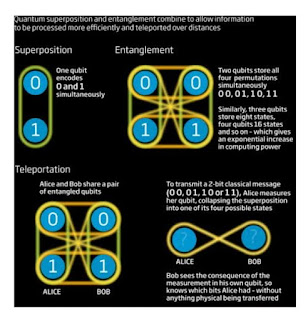Consciousness and the Quantum World: The Observer Effect and the Nature of Reality
Quantum mechanics, the fascinating and often perplexing theory that governs the behavior of particles at the smallest scales, presents us with some mind-bending concepts. One of these is the idea that everything we observe may exist in a state of probability, or more precisely, in a superposition of states, until we become conscious of it.
At the heart of this idea is the wave function, a mathematical description in quantum mechanics that represents the state of a system. According to the famous Schrödinger's equation, the wave function evolves over time, describing the probabilities of different outcomes when a measurement is made. Until a measurement is made, the system is said to exist in a superposition of states, where each state has a certain probability of being observed.
This notion challenges our classical understanding of the world, where objects are assumed to have definite properties independent of observation. In the quantum world, particles can exist in multiple states simultaneously, a concept famously illustrated by Schrödinger's cat, which is both alive and dead until observed.
But what does this mean for our everyday experience? Does it imply that everything around us exists in a state of uncertainty until we look at it? Some interpretations of quantum mechanics suggest so, leading to the intriguing idea that our consciousness plays a fundamental role in the nature of reality.
This idea, known as the observer effect, is a subject of much debate and speculation. Some argue that consciousness collapses the wave function, determining the outcome of measurements. Others propose more nuanced views, suggesting that consciousness may not be necessary for the collapse of the wave function, but rather that it plays a role in the selection of a particular outcome from the range of possibilities.
Regardless of the interpretation, the implications are profound. If true, it would mean that the act of observation is not just a passive process of gathering information, but an active participation in shaping reality itself. It would suggest a deep connection between the observer and the observed, blurring the line between the subjective and objective worlds.
Of course, this idea is not without its critics and skeptics. Many physicists argue that the observer effect is a misinterpretation of quantum mechanics, stemming from a misunderstanding of the nature of measurement in quantum systems. They point out that quantum superpositions are not macroscopic phenomena and do not apply to everyday objects.
But even if the observer effect does not apply at the macroscopic level, the fact remains that quantum mechanics forces us to confront a reality that is far more complex and mysterious than we once thought. It challenges us to rethink our assumptions about the nature of reality and our place in it, reminding us that the universe is far more strange and wonderful than we can imagine.
Share your thoughts
Info.NaseemJaved@gmail.com




Comments
Post a Comment